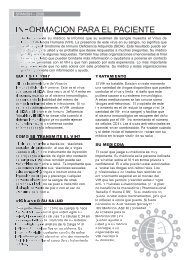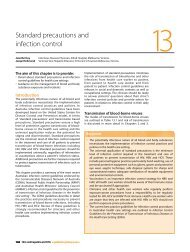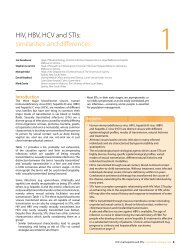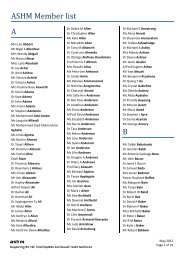B Positive – all you wanted to know about - ASHM
B Positive – all you wanted to know about - ASHM
B Positive – all you wanted to know about - ASHM
Create successful ePaper yourself
Turn your PDF publications into a flip-book with our unique Google optimized e-Paper software.
Treatment-related side effects<br />
the safety profile of nucleoside and nucleotide<br />
analogues is similar <strong>to</strong> that of the placebo.<br />
in general, these drugs are remarkably well<br />
<strong>to</strong>lerated. their major concerns are the risks of<br />
resistance and safety in pregnancy.<br />
tenofovir, an oral nucleoside agent currently<br />
in clinical studies, may be the safest option<br />
for women in their child-bearing years, given<br />
its recent category b pregnancy listing.<br />
it is currently only approved for HbV/HiV<br />
coinfection, but not for HbV monoinfection. 1<br />
(category b: Presumed safety based on animal<br />
studies, with no controlled studies in pregnant<br />
women, or if animal studies have shown<br />
an adverse effect that was not confirmed<br />
in controlled studies in women in the first<br />
trimester and there is no evidence of a risk in<br />
later trimesters. available at: http://www.tga.<br />
gov.au/docs/html/medpreg.htm).<br />
in contrast, pegylated interferon has many<br />
side effects. anecdot<strong>all</strong>y, it seems <strong>to</strong> be better<br />
<strong>to</strong>lerated in patients with HbV rather than<br />
patients with hepatitis c virus (HcV). despite<br />
this observation, patients taking interferon<br />
may experience many different side effects that<br />
require careful consideration and appropriate<br />
intervention. treatment is usu<strong>all</strong>y supportive<br />
and symp<strong>to</strong>m-based. the most common side<br />
effects early on are flu like symp<strong>to</strong>ms and the<br />
following measures may be of benefit:<br />
� simple antiemetics, such as me<strong>to</strong>clopramide,<br />
for nausea and vomiting<br />
� antispasmodics, such as buscopan, for<br />
abdominal cramps<br />
� Paracetamol for headaches, fevers, myalgia<br />
and arthralgia (avoid nsaids because<br />
of concomitant thrombocy<strong>to</strong>penia with<br />
treatment).<br />
Mood disturbances become more common<br />
as therapy continues and appropriate<br />
interventions may include:<br />
� benzodiazepines or zolpidem for insomnia<br />
� antidepressants: ssris are preferred for<br />
anxiety and depression.<br />
if the patient has a his<strong>to</strong>ry of depression, a<br />
low threshold should exist for starting ssri<br />
therapy pre-treatment. Patients already on<br />
antidepressants may need a dose increase<br />
during interferon therapy. for patients starting<br />
an ssri during treatment, the ssri is usu<strong>all</strong>y<br />
continued for six months post-cessation of<br />
interferon therapy.<br />
skin changes are common during therapy and<br />
patients often complain of dry, itchy skin and<br />
a multitude of skin rashes. therapy is usu<strong>all</strong>y<br />
based on keeping the skin hydrated, with<br />
regular use of moisturisers and emollients.<br />
antihistamines can be used, particularly if<br />
pruritus is exacerbating insomnia. steroidbased<br />
creams can be tri<strong>all</strong>ed for rashes that do<br />
not respond <strong>to</strong> any of the above measures.<br />
Lifestyle issues while on therapy appear <strong>to</strong> be<br />
important. Patients can trial a variety of lifestyle<br />
changes during therapy <strong>to</strong> help with interferonrelated<br />
side effects. regular exercise before and<br />
during therapy seems <strong>to</strong> help with lethargy and<br />
myalgias. anecdot<strong>all</strong>y, patients who exercise<br />
regularly seem <strong>to</strong> <strong>to</strong>lerate treatment better<br />
than those who are sedentary. Patients should<br />
avoid alcohol if possible.<br />
for information <strong>about</strong> reimbursed therapy:<br />
http://www.pbs.gov.au/html/healthpro/<br />
home<br />
for information <strong>about</strong> the listing of drugs in<br />
pregnancy: http://www.tga.gov.au/docs/<br />
html/medpreg.htm<br />
Alternative therapies<br />
the use of complementary, alternative or<br />
chinese medicine has not been well studied<br />
in patients undergoing treatment with<br />
interferon-based therapies; because of the<br />
risk of hepa<strong>to</strong>xicity, the use of these therapies<br />
should be discouraged while the patient is<br />
undergoing interferon-based therapy. Massage,<br />
hypnotherapy, acupuncture and other nonmedicinal<br />
based therapies may provide<br />
symp<strong>to</strong>m-based relief during treatment. chapter<br />
13: the role of complementary medicine in<br />
hepatitis b provides further details <strong>about</strong> the<br />
benefits and dangers of using alterantive<br />
therapies in the treatment of hepatitis b.<br />
b <strong>Positive</strong> <strong>–</strong> <strong>all</strong> <strong>you</strong> <strong>wanted</strong> <strong>to</strong> <strong>know</strong> <strong>about</strong> hepatitis b: a guide for primary care providers 63






